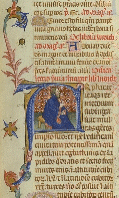
The name "Arphaxad" transliterated into Ptolemaic Egyptian hieroglyphics,
courtesy of a conversion program written by Serge Rosmorduc.
To try it out for yourself, visit his site, Nom en Hiéroglyphes.

Arphaxad was your typical Biblical character. He was the grandson of Noah, he lived a very long time, he went forth and multiplied. Other than that, there isn't much written about him, but he jumped out at me the first time I read his name.
There's something about his name that fascinates me on a purely secular level. (The literal translation of it is "one who releases," but that doesn't help much.) Granted, there are many cool names in the Bible--Nebuchadnezzar springs to mind--but this one is different. It has a certain symmetry to it, and a unique timelessness. In short, it doesn't seem like the name of a person out of the Old Testament.
Arphaxad (or Arpachshad, a greatly inferior spelling) first appears shortly after the story of the Deluge in the Book of Genesis. All of his vital stats are given in the following passage:
[N.B. All quotations are taken from the NIV Bible, except for Judith, which is taken from the NRSV.]
He also makes a brief cameo in 1 Chronicles, within the historical record from Adam to Abraham. This brief passage reiterates the family line of the Semites as contained in Genesis' Table of Nations:
His only other appearance is in the Gospel According to Luke, where I originally saw the name. He is one of the "ancestors" of Jesus through Joseph's paternal line:
Yes, I realise there is a genealogical discrepancy, but this delves into an area of Biblical document sources that I am not qualified to discuss here.


An illuminated folio of King Arphaxad
in the Breviary of Martin of Aragon,
a Catalonian document from the 15th century.
Long after I started using this name, I discovered that there is actually another Arphaxad in the Bible, an entirely different person. This oversight is understandable, since the other Arphaxad only shows up as a relatively minor character in the Book of Judith--part of the Apocrypha or Deuterocanonical books of the Old Testament, which are usually not accepted as canon and therefore not included in all versions of the Bible.
In this case, Arphaxad is a king--as is that other aforementioned Biblical character with a cool name, Nebuchadnezzar (from the Akkadian, "O Nabu, protect my boundary stone"), who is described as his contemporary. Arphaxad's reign is recounted in a passage which also details his fortifications:
King Arphaxad, as told here, was sovereign over a people called the Medes, so one could describe him as King of All Media. (I apologise for that one, but I couldn't resist.) Media was a real place, geographically located in what is today northwestern Iran, including Azerbaijan, Kurdistan, and parts of Kermanshah. Relating the date of his rule to that of Nebuchadnezzar also makes him a lot more historically reliable, as the latter is known to have been king of the Chaldean Empire from 605-562 BCE, firmly dating the beginning of Judith to 594 BCE.
Nebuchadnezzar's campaign of expansion eventually causes conflict with Arphaxad:
Amidst this stage of epic battle, Nebuchadnezzar is encouraged by the support he receives to issue an ultimatum, urging the surrounding nations to join him in the war. Everyone disregards the summons, however, because they regard him as only one man, not worth fearing. This angers Nebuchadnezzar, and he swears revenge on the whole region.
Five years later, the war between Nebuchadnezzar and Arphaxad ends in ignominious defeat:
Arphaxad is later symbolically avenged (though that's not really the point of the story) by the book's title character. Judith is a beautiful Israelite widow whose town is threatened by an attacking army of Assyrians under the command of Holofernes, chief general in the service of Nebuchadnezzar and second only to him. Calling upon God to give her strength, Judith goes into the Assyrian camp, beguiling Holofernes with promises of loyalty. She works her way into his trust (as well as his tent) and uses the opportunity to decapitate him while he is in a drunken stupor. By doing this, she saves all of Israel from Assyrian invasion, and she is revered as a hero for the rest of her life.
